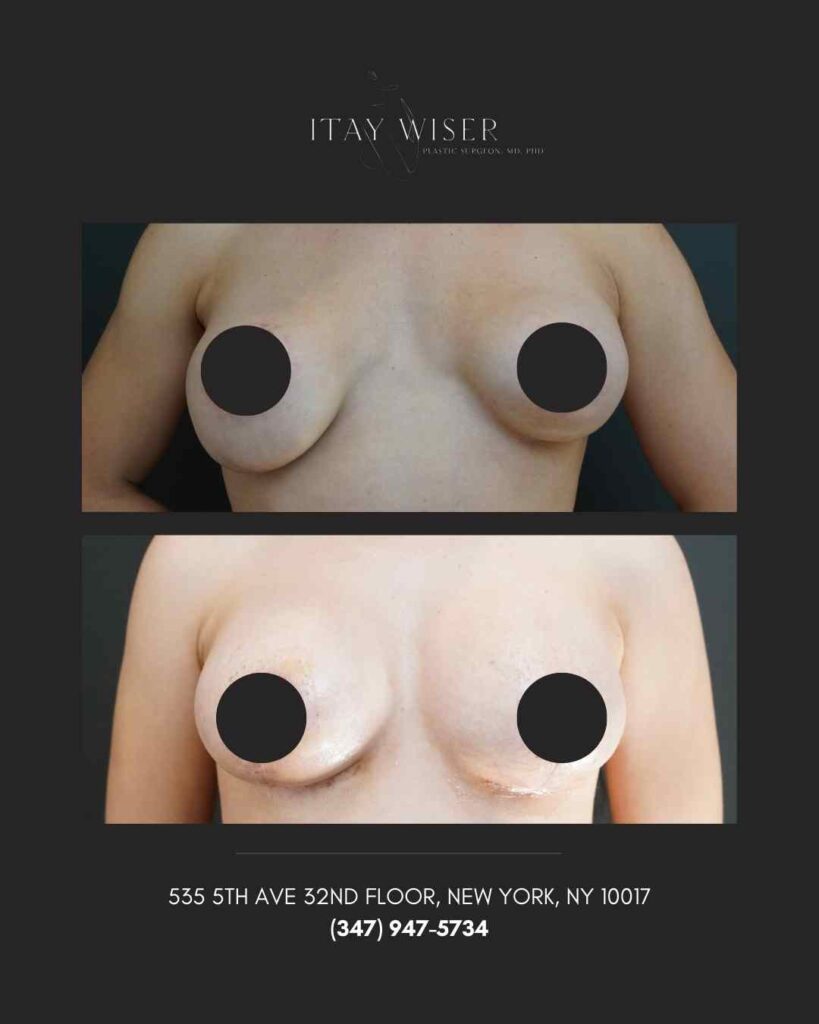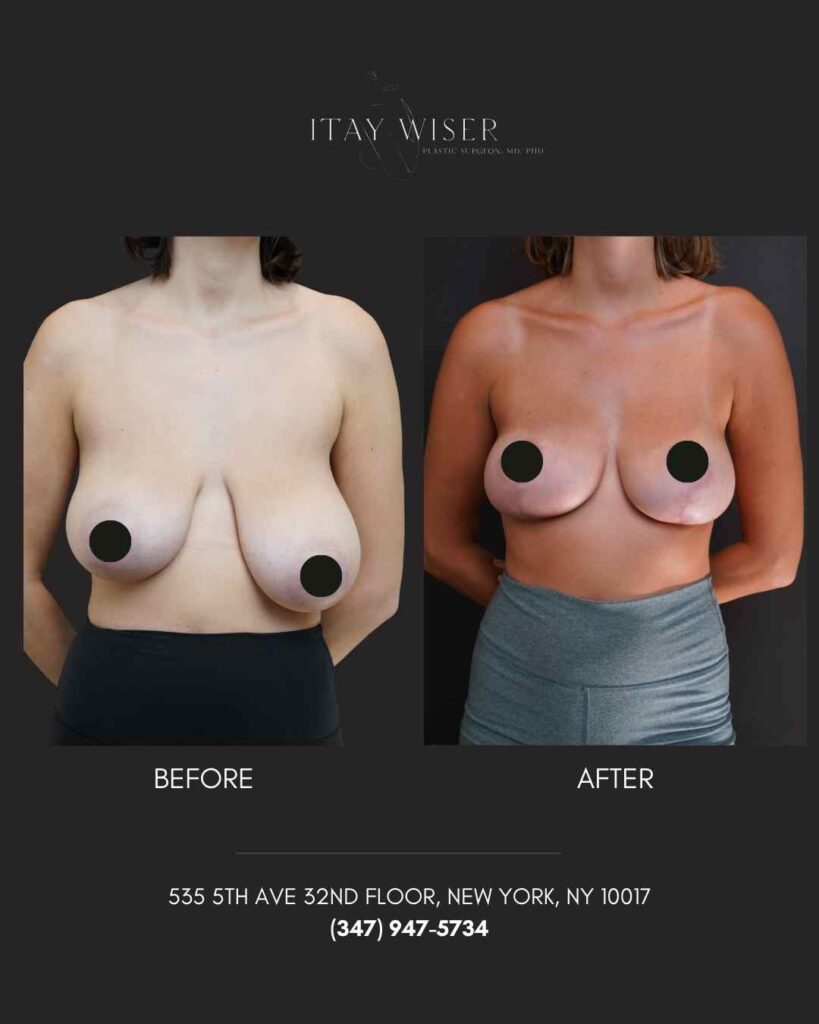Breast Asymmetry & Tubular Breast Correction in NYC
Understanding Breast Asymmetry & Tubular Breasts
Breast asymmetry and tuberous breast deformity affect many individuals, impacting both appearance and confidence. While minor variations in breast size are normal, significant differences or tubular boobs may require breast asymmetry correction. This guide explores the causes, symptoms, and best surgical treatments for breast asymmetry and tubular breast correction.
Whether you have tuberous breast deformity, uneven boob size, or asymmetrical nipples, modern surgical techniques can help. From breast augmentation to breast reduction and reshaping, a skilled plastic surgeon like Dr. Itay Wiser can restore confidence and harmony to your body.
Book your consultation today and start your journey toward a beautifully balanced look!
Table of Contents
Before & After


Why Patients Trust Dr. Wiser
Chief of Plastic Surgery at Mount Sinai Elmhurst
Thousands of successful
procedures
Advanced techniques for natural-looking results
What is Breast Asymmetry?
Breast asymmetry occurs when one breast differs from the other in size, shape, position, or nipple placement. Common types include:
Uneven breasts – One breast larger than the other.
Tubular breasts – Developmental condition causing a constricted, elongated breast shape.
Asymmetric boob position – One breast sits higher than the other.
Areola and nipple asymmetry – Different sizes or locations of nipples.
Breast asymmetry can result from genetics, hormonal changes, weight fluctuations, or trauma. Some individuals experience developing asymmetry during puberty, while others notice changes due to aging or pregnancy.
What is a Tubular Breast Deformity?
A tubular breast deformity is a congenital condition where the breast tissue doesn’t develop fully, leading to:
Constricted breast shape – Narrow or elongated appearance.
Large tuberous breast – Misshapen, often smaller than average.
Areolar herniation – Puffy, protruding nipples.
Breast asymmetry – One tubular breast may be larger or more pronounced than the other.
This condition, also known as tuberous boobs, can be corrected through surgical procedures like breast augmentation, tissue expansion, and fat grafting.
Causes of Breast Asymmetry & Tubular Breasts
The causes of breast asymmetry and tubular breast deformity include:
- Genetic Factors. Breast asymmetry often runs in families, leading to uneven breast size or tubular tits.
- Hormonal Imbalances. During puberty, hormonal fluctuations can impact breast tissue development, leading to focal asymmetry meaning irregular growth patterns.
- Pregnancy & Breastfeeding. Uneven boob size may develop due to hormonal changes, milk production, and tissue stretching.
- Trauma or Surgery. Past breast surgeries, injuries, or double mastectomy with reconstruction can result in breast deformation.
Surgical Treatment Options for Breast Asymmetry & Tubular Boobs
Breast implants or fat injected into breasts can enhance volume and symmetry. Options include:
- Silicone breast implants for a natural look.
- Saline breast implants for adjustable sizing.
- Fat transfer breast augmentation for those wanting a more natural enhancement.
For sagging or lopsided breasts, a boob lift can elevate and reshape the breasts while aligning the nipples and areolas.
For individuals with one breast larger than the other, breast reduction surgery removes excess tissue to create symmetry.
Correcting tubular breasts involves several techniques:
- Tissue expansion to stretch breast skin.
- Implants or fat grafting to add volume.
- Areolar reshaping to correct puffy or misshapen nipples.
For cases involving large tubular breasts, multiple procedures may be combined, such as:
Breast lift + implants for volume and lift.
Reduction + reshaping for balanced results.
What to Expect Before & After Breast Asymmetry Surgery
Pre-Surgery Preparation
Post-Surgery Recovery
Is Breast Asymmetry & Tubular Breast Surgery Painful?
Most patients experience mild to moderate discomfort in the first few days following surgery, but this is easily managed with prescribed pain medication.
To further minimize post-operative pain, Dr. Itay Wiser utilizes an advanced nerve block technique during surgery. This temporarily numbs the surgical area, significantly reducing discomfort for the first 24-48 hours after the procedure. Patients who receive a nerve block often report a smoother, more comfortable recovery with less reliance on pain medication.
📌 Dr. Wiser’s focus on patient comfort ensures that you experience the easiest and most pain-free recovery possible.
FAQ – Breast Asymmetry & Tubular Breast Correction
How do I know if I have tubular breasts?
If your breasts have a narrow base, appear elongated, or have puffy, herniated areolas, you may have a tubular breast deformity.
How long does it take to recover from breast asymmetry correction?
Most patients return to normal activities in 2-6 weeks, with full results visible after 3-6 months.
When Can I Return to Work?
For most patients with office or desk jobs, you can typically return to work within about 1 week after breast augmentation surgery, as long as your duties are not physically demanding.
If your job requires heavy lifting, strenuous activity, or prolonged physical effort, it is recommended to wait approximately 4 to 6 weeks to ensure proper healing and avoid complications.
Dr.Itay Wiser will provide personalized advice based on your recovery progress, so it’s essential to follow their guidance for the best results.
Breast Asymmetry Correction Cost
The cost of breast augmentation can vary depending on your specific needs, the procedure details, and location. Schedule a free consultation with us, and we’ll be happy to provide you with personalized pricing and more information
Does Insurance Cover Breast Asymmetry Correction?
Most cosmetic breast surgeries are not covered by insurance. However, if breast asymmetry results from trauma, surgery, or a congenital condition, partial coverage may be available.

